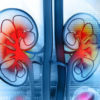Gout Treatment in Northern New Jersey
 Pain and swelling related to flares of gout can disrupt sleep patterns and affect your quality of life. It’s important that patients with this condition pursue treatment, or it may worsen over time. Bergen Medical Associates treats patients with gout in northern New Jersey. The board-certified physicians and qualified medical professionals in our rheumatology department can diagnose and prescribe gout treatments. Patients can access these services at any of our convenient office locations.
Pain and swelling related to flares of gout can disrupt sleep patterns and affect your quality of life. It’s important that patients with this condition pursue treatment, or it may worsen over time. Bergen Medical Associates treats patients with gout in northern New Jersey. The board-certified physicians and qualified medical professionals in our rheumatology department can diagnose and prescribe gout treatments. Patients can access these services at any of our convenient office locations.
What Is Gout?
Gout occurs when the body retains too much uric acid in its system. While high levels of unprocessed uric acid don’t affect everyone, people who are susceptible develop a type of inflammatory arthritis known as gout. As a waste product, uric acid usually is dissolved in the blood and filtered through the kidneys, eventually leaving the body through urination. The body uses uric acid to break down purines, which are chemical compounds contained in some foods, drinks, and body tissues.
When there are high levels of uric acid in the blood it is known as hyperuricemia. In people for whom hyperuricemia causes the development of crystals, these can create formations in the joints. These same crystals can also develop into kidney stones. Gout attacks usually include intense pain and swelling in the joints, which can affect a person’s ability to get around and get things done.
What Are Signs and Symptoms of Gout?
The pain of gout flares often wakes patients up during the night. The big toe joint is commonly affected, but other parts of the body affected by gout can include:
- Knees, ankles, and feet
- Elbows, wrists, and hands
Whichever joint or joints are affected by the onset of gout flares, symptoms may include:
- Swelling and redness
- Severe pain
- Warmth and burning sensations in the area
- Stiffness
- Tenderness
Usually, only one joint at a time shows these types of symptoms. However, gout flares can spread to other areas of the body. Attacks of gout may last up to a week or two, although some patients have flares that last longer. Gout treatments can help reduce the frequency and severity of these flares and help prevent the condition from becoming worse.
What Are Risk Factors for Gout?
Not everyone with high uric acid levels experiences the type of inflammatory arthritis known as gout. But there are a few risk factors that have been identified, including:
- People who are assigned male sex at birth
- Middle-aged or older, including postmenopausal women
- Obesity
- Family history of gout, especially in parents or grandparents
- Congestive heart failure
- Kidney disease
- Diabetes
- High blood pressure
- Blood cancer
- Metabolic syndrome
- Diet high in animal proteins and purines, including shellfish, game, and organ meats
- Regular alcohol consumption
- Consumption of high levels of fructose
- Taking some medications, including diuretics, low-dose aspirin, and high levels of niacin
- Taking immunosuppressants
- Some rare genetic conditions that lead to increases in uric acid
How Is Gout Diagnosed at Bergen Medical Associates?
Patients who present with symptoms of gout at Bergen Medical Associates will receive a thorough physical examination. Our rheumatology team may order blood tests to measure the levels of uric acid and take a fluid sample from the affected joint. In addition, imaging tests can help visualize uric acid crystal buildups. These may include CT scans, MRI, X-rays, and ultrasound. If the diagnosis is gout, our medical practitioners will want to know when the flares started, how often they are experienced, and the severity of the gout attacks. This information will help develop a gout treatment plan for the individual patient.
Gout Treatment Options
Luckily for those who experience painful symptoms related to gout flares and attacks, treatments are available. Depending on the severity of the condition, the experienced practitioners at Bergen Medical Associates may prescribe:
- Nonsteroidal anti-inflammatory drugs
- Icing the inflamed areas
- Corticosteroids to reduce inflammation by pill or injection
- Medications to lower uric acid levels
- Lifestyle and diet changes
Schedule an Appointment at Bergen Medical Associates in Northern NJ
Bergen Medical Associates offers a wide variety of medical specialties, including internal medicine and gastroenterology, at convenient locations in northern New Jersey. Our team of physicians, nurses, and highly trained staff work collaboratively and are available for appointments. If you require gout treatments, let our medical practitioners help you manage this condition. For more information, contact us today.












